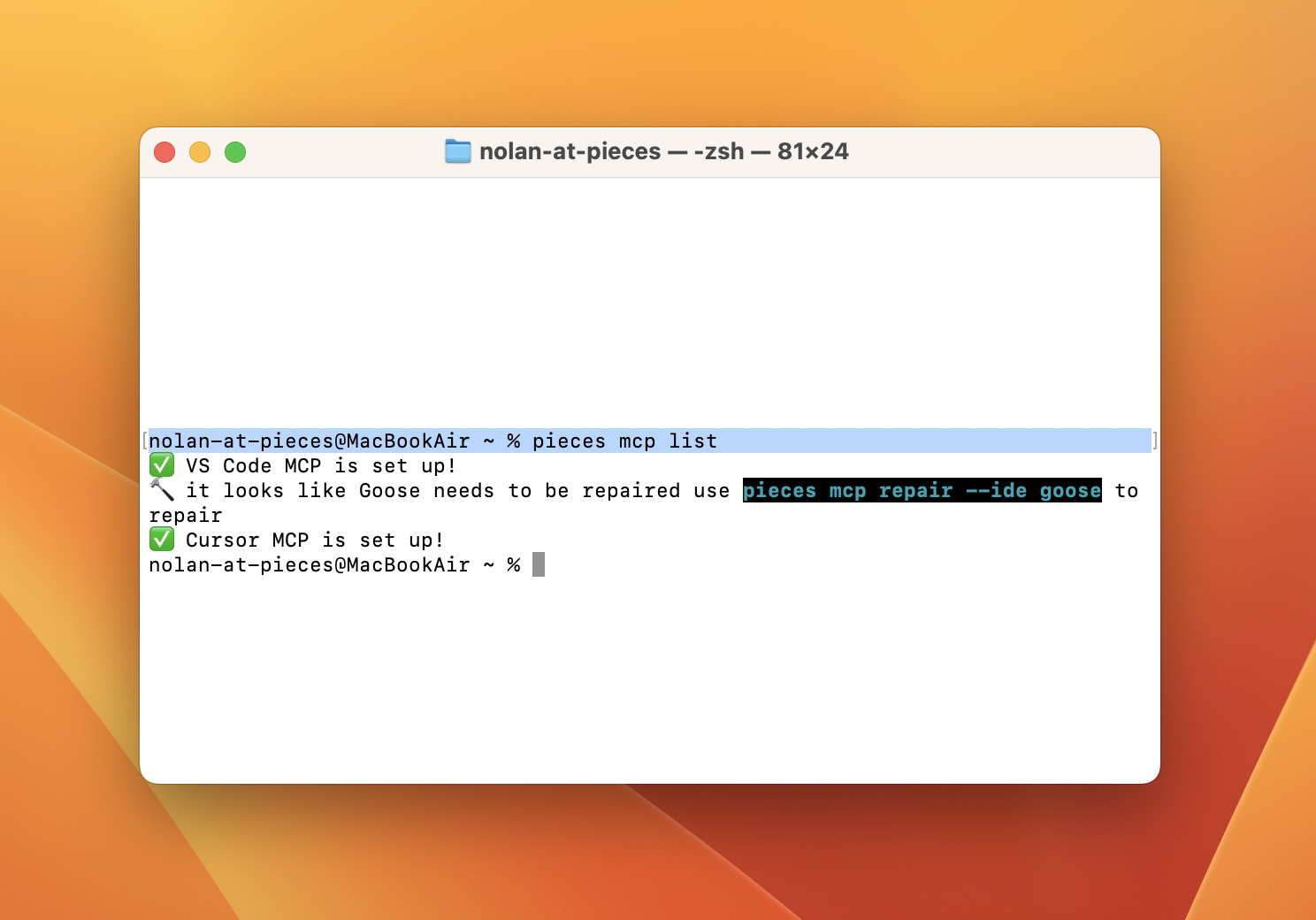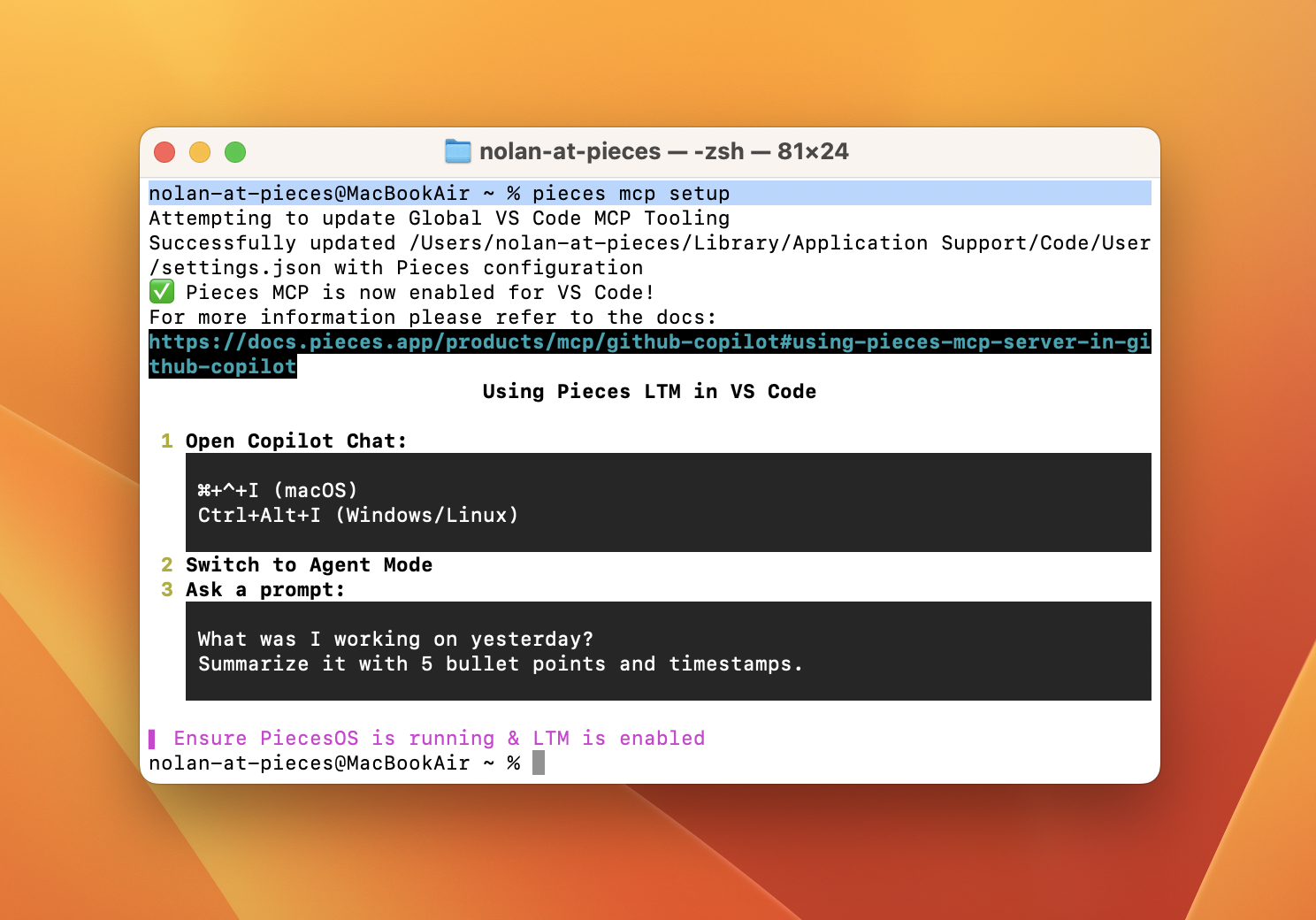Accessing Copilot Chat in your Terminal
There are two ways to manage your Copilot chats in the Pieces CLI.
Starting a New Copilot Chat
To quickly start a conversation with Pieces Copilot:
If you’re not in Pieces CLI, in your terminal, you can type `pieces ask query`, replacing `query` with your question.
<Image src="https://storage.googleapis.com/hashnode_product_documentation_assets/cli_assets/pieces_copilot/chat/ask_pieces.gif" alt="" align="center" fullwidth="true" />
Opening Previous Chats
To resume or explore an earlier conversation:
chats: Show all your conversations. The one highlighted in green is where new questions go by default.chat: Display the messages in your current conversation.chat <number>: Switch to conversation<number>and show its messages.
Use these flags with your chat command to manage conversations as you go:
chat --new,chat -n: Create a new conversation and switch to it.chat --delete,chat -d: Delete the conversation you’re currently viewing.chat --rename [name],chat -r [name]: Rename the conversation you’re viewing. If you don’t provide[name], the assistant will suggest one.
Read more about what commands are available in the Pieces CLI.
Contextualized Chats
You can narrow Copilot’s focus by feeding it specific materials or files when you ask a question.
via Material Index
Pieces Copilot will load material #4 as context.
<Image src="https://storage.googleapis.com/hashnode_product_documentation_assets/cli_assets/pieces_copilot/chat/pieces_context_chat.gif" alt="" align="center" fullwidth="true" />
via File Path
Use a folder of specific file as context for Pieces Copilot by initiating the conversation at a specified path.
Pieces Copilot will read that file before answering.
Copilot loads material #2 and `specs.md` before generating its response.
<Image src="https://storage.googleapis.com/hashnode_product_documentation_assets/cli_assets/pieces_copilot/chat/adding_file.png" alt="" align="center" fullwidth="true" />
Pieces MCP
The Pieces MCP offers several useful commands within the Pieces CLI, from setting up the MCP to learning more about it. Discover the different commands:
Setup
Automatically sets up MCP for VS Code, Goose, or Cursor.
* VS Code
* Goose
* Cursor
<Image src="https://storage.googleapis.com/hashnode_product_documentation_assets/cli_assets/pieces_copilot/chat/selecting_mcp_option.png" alt="" align="center" fullwidth="true" />
After selecting the environment you plan to set up Pieces MCP with, you’ll be prompted with the next set of questions.
* `User Settings` — Make the MCP available in any project you work on within VS Code.
* `Workspace Settings` — Save the MCP locally to the current project you’re working on.
When you select the workspace you want to set up, Pieces CLI will automatically add the configuration for you and guide you through using Pieces MCP within the platform you chose.
List
The mcp list command displays the current implementations of Pieces MCP on your development platforms.
Currently, the Pieces CLI supports integration with GitHub Copilot, Goose, and Cursor.

Docs
The mcp docs command displays all of the mcp documentation correlated with the supported development environments with the Pieces CLI and Pieces MCP.
Repair
The mcp repair command checks how the Pieces MCP is set up in the platforms supported by Pieces CLI.
If it finds any issues, it will automatically fix them and ask you to type y for yes or n for no. Then, press return (macOS) or enter (Windows/Linux) to confirm your choice.
Status
Running mcp status within the Pieces CLI will automatically check all implemented platforms to make sure the Pieces MCP implementation is running correctly.
If it finds that an implementation is broken, it will ask if you want to auto-repair the MCP server.
Type y for yes or n for no, and press return (macOS) or enter (Windows/Linux) to confirm your choice.

Improving Code Consistency & Standardization
The Pieces Copilot enhances code quality by identifying inconsistencies and providing practical suggestions for standardization.
Naming Inconsistencies
Suppose functions across your workspace use inconsistent naming patterns (e.g., authenticateUser in authHandler.go vs. retrieveUserProfile in userHandler.go).
In that case, Pieces Copilot can suggest adopting a standardized naming convention for better readability and maintainability, like this:
func authenticateUser(ctx context.Context, credentials Credentials) (User, error) {
if credentials.Username == "" || credentials.Password == "" {
return User{}, errors.New("missing credentials")
}
}
Inconsistent Error Handling
If error-handling strategies differ across files (e.g., structured errors in authService.go vs. inconsistent handling in userService.go), Pieces Copilot can help unify the approach:
func LoginUser(credentials Credentials) (string, error) {
token, err := authenticate(credentials)
if err != nil {
return "", fmt.Errorf("login failed: %w", err)
}
return token, nil
}